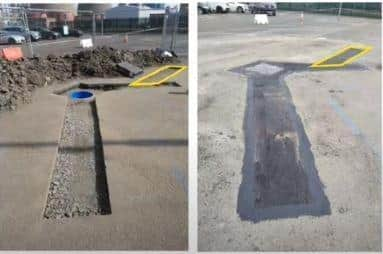Falkirk Council: Tiny trench dug for Ineos now gives them permission for controversial work
and live on Freeview channel 276
A lawyer for the company told members of Falkirk Council’s planning committee on Wednesday that there are no immediate plans to actually go ahead with any development on Bo’ness Road at the moment as Ineos is “considering its next steps”.
The original planning permission for Ineos to build a security centre, two gatehouses and up to five pipe bridges was granted by Scottish Ministers in 2019, despite widespread opposition as it would mean the partial closure of the Bo’ness Road.
Advertisement
Hide AdAdvertisement
Hide AdHowever, there were several conditions attached to that permission – including one that work should start within five years.


On March 21 this year, that permission would have expired if no work had started.
However, Ineos has now presented Falkirk Council with evidence, including affidavits and photographs, that work has indeed taken place on the foundations for one of the security blocks.
On Wednesday members of Falkirk Council’s planning committee were told that the decision they were being asked to make was a technical one that had very clear legal definitions.
Advertisement
Hide AdAdvertisement
Hide AdPlanning officers said Ineos had provided enough evidence to grant the certificate of lawfulness as requested, which would mean “the works to complete the permission could theoretically be carried out at any point in time”.
Independent councillor Brian McCabe, who was allowed to speak although not a member of the committee, questioned the fact that such a small piece of work was enough to justify the certificate.
“What the applicants have done is dug a hole and filled it back in again – that’s all they’ve done!” he said.
He noted that no building warrant had been submitted for the foundation works – in his opinion “because none had been carried out”.
Advertisement
Hide AdAdvertisement
Hide AdHowever, a lawyer representing the company told members of the planning committee that previous legal cases clearly showed that a trench having been dug, then filled in again, was enough evidence to show that work had started.
He noted that the trench was not required to actually contain any foundations and added that while the trench in question has been backfilled, this is “perfectly lawful”.
Members of the planning committee were also advised that precedents have shown there is no requirement for the applicants to show there is any intention to actually build what they have permission for.
The lawyer added that at the moment Ineos is “considering its next steps” and the local community will be kept up to date with developments.
Advertisement
Hide AdAdvertisement
Hide AdPlanning officers did, however, stress to members that if or when any building work takes place the company will still have to comply with a strict set of conditions that came with the permission.
In the event that the company does decide to go ahead with the development, the final decision on any road closure rests with the local authority who would be asked to make a ‘stopping up order’.